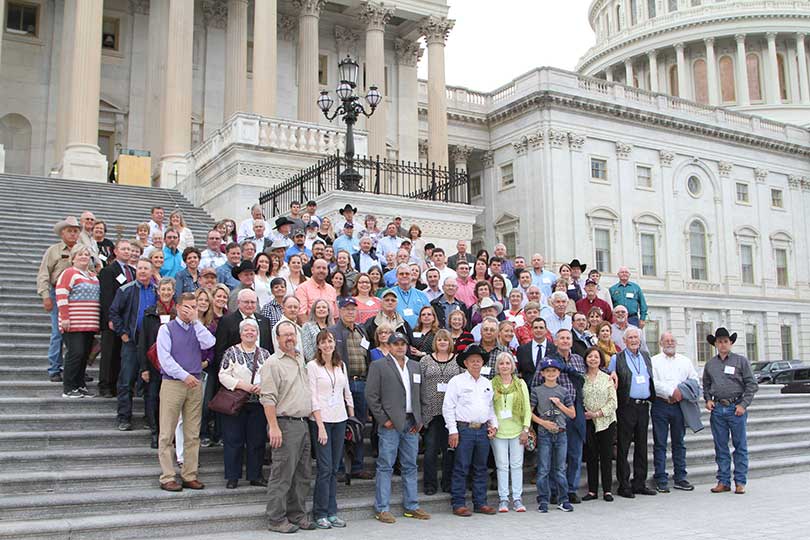By Jessica Domel
Multimedia Editor
The voices of Texas farmers, ranchers and small business owners are being heard in Washington, D.C.
A group of Texas Farm Bureau (TFB) members from across the state traveled to our nation’s capital this week to urge their respective lawmakers to consider Texas agriculture throughout the legislative session.
“We hear it from the Congressmen themselves and we hear it from our U.S. senators that they want to talk to their constituents. They want to talk to people who are actually doing the things we’re talking about,” TFB President Russell Boening said. “We’re talking about agriculture, regulatory reform and all those types of things. They want to actually talk to the people that it’s affecting.”
During this year’s National Affairs Awards Trip, members discussed immigration reform, border security, the next farm bill, the need for a reliable guest worker program, taxes, regulatory reform and other issues facing agriculture and rural Texas.
Both TFB and American Farm Bureau Federation (AFBF) have staff who work with lawmakers in Austin and Washington, D.C. on behalf of members. But it’s the people who are impacted most by potential legislation that really hits home.
“We pretty much lay a foundation on that policy across the Hill. When the farmers and ranchers come from their home state and home county and they come up and say the same things, they build the road on top of the foundation that we’ve provided for them,” AFBF President Zippy Duvall said. “It completes the process. Without them coming, we would never get anything done because they’re the ones that bring the deals together.”
The repeal of the estate, or death, tax is one area where TFB members have been involved. Members traveled the state with Congressman Kevin Brady discussing the issue and how it’s hurting farmers, ranchers and landowners.
“I love it because our Texas Farm Bureau men and women are the hardest working people in the world. They’ll meet day or night on all these issues. They don’t hesitate to come to Washington,” Brady said. “They don’t hesitate meeting in Texas. They’ve traveled the state on behalf of getting rid of the death tax, on getting rid of Waters of the U.S. I’m just honored to be partners.”
Brady also shared that there are several plans now to fix the broken tax code.
“What we’re proposing are the lowest tax rates on our farmers and ranchers in modern history and ending the death tax,” Brady said.
Brady, along with Congressman Will Hurd and Senator Ted Cruz, told members that simplifying the tax code will allow nine out of 10 Americans to file their taxes on a postcard.
Cruz and fellow Senator John Cornyn both expressed optimism for regulatory reform under the new presidential administration.
“I see tremendous opportunity for our country and for us to work together to try to do some things we maybe wouldn’t have been able to do if the election had turned out another way,” Cornyn said.
Cornyn said he has hopes for trade agreements that will benefit American farmers, ranchers and businesses.
“Secretary [Wilbur] Ross reassured me the administration is committed to trade although they expressed a clear preference for bilateral trade agreements, one-on-one, as opposed to multi-lateral. They thought we gave up too much in terms of substance and accountability,” he said.
As a Texan, Cornyn said he understands how important Mexico is as a trading partner.
“Five million American jobs depend on trade between the United States and Mexico alone,” Cornyn said. “He [Secretary Ross] reassured me that they weren’t interested in tearing up NAFTA and throwing it out the window, but rather renegotiating NAFTA to update it, which if you consider everything that’s happened in the last 20 years, particularly in the energy sector, that makes some sense.”
Border security, immigration reform and the need for a viable guest worker program were discussed with several congressmen, including Rep. Will Hurd, who has 830 miles of border in his district.
“We can secure our border and facilitate the movement of goods and services, but building a wall from sea to shining sea is the most expensive and least effective way to do border security,” Hurd said. “We should be increasing the amount of intelligence we’re collecting on drug trafficking orga

